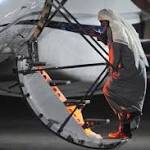 |
| Radical Muslim cleric Abu Qatada arrives back at his home after being released on bail, in London in this November 13, 2012 file photograph. Credit: REUTERS/Neil Hall/Files |
LONDON/AMMAN (Reuters) - A radical Muslim cleric once called "Osama bin Laden's right-hand man in Europe" was deported from Britain to Jordan on Sunday, ending years of British government efforts to send him back home to face terrorism charges.
A police convoy collected Abu Qatada from London's Belmarsh prison after midnight and drove him through the streets of the capital to a military airport. Soon after arriving in Jordan, he was taken under heavy guard to a nearby military court.
The legal battle to deport Qatada has embarrassed successive British governments. Prime Minister David Cameron said he was "absolutely delighted" it was over.
"It's an issue that ... has made my blood boil - that this man who has no right to be in our country, who's a threat to our country, that it took so long and was so difficult to deport him," Cameron told reporters.
Jordan's Minister of State Mohammad al-Momani told Reuters Qatada would have a fair trial "with the Jordanian judiciary respecting human rights." Jordan convicted Qatada in his absence of encouraging militants who planned bomb attacks in 1999 and 2000. He will get a re-trial on those charges.
Britain had said the preacher posed a national security risk, but courts had repeatedly blocked his deportation.
His return was made possible by an extradition treaty adopted by Jordan and Britain last week that satisfied the concerns of British judges about the use of evidence obtained through torture.
Lawyers acting for Qatada said in May the cleric would leave voluntarily once the treaty had been finalized.
Sermons of the heavily bearded Qatada were found in a Hamburg flat used by some of those who carried out the September 11, 2001 attacks on the United States.
Qatada was deported on the anniversary of the July 7, 2005 suicide attacks on London's subway and bus network that killed more than 50 people.
Linked by a Spanish judge to the late al Qaeda leader Osama Bin Laden, Qatada has been in and out of jail in Britain since first being arrested in 2001. He was sent back to prison last March for breaching his bail conditions.
 |
| People board the aeroplane which will carry Radical Muslim cleric Abu Qatada to Jordan from RAF Northolt base in London, July 7, 2013. Credit: REUTERS/Paul Hackett |
Jordan charges radical Muslim cleric Abu Qatada after extradition from UK
A Jordanian military prosecutor says he has charged a radical Muslim preacher with conspiring to carry out Al Qaeda-linked attacks on Americans, Israelis and other Westerners in this key U.S. ally.Abu Qatada, 53, arrived in Jordan earlier Sunday after being deported from Britain.
His extradition had been blocked in British and European courts for more than a decade over human rights concerns. Britain and Jordan ratified a treaty on torture aimed at easing those worries, clearing the way for his deportation.
The military prosecutor says Abu Qatada will be detained for 15 days pending further questioning. He says the cleric will remain at Muwaqar I, a prison in Amman's southeastern industrial suburb of Sahab
(Editing by Andrew Heavens and Matthew Tostevin)

No comments:
Post a Comment